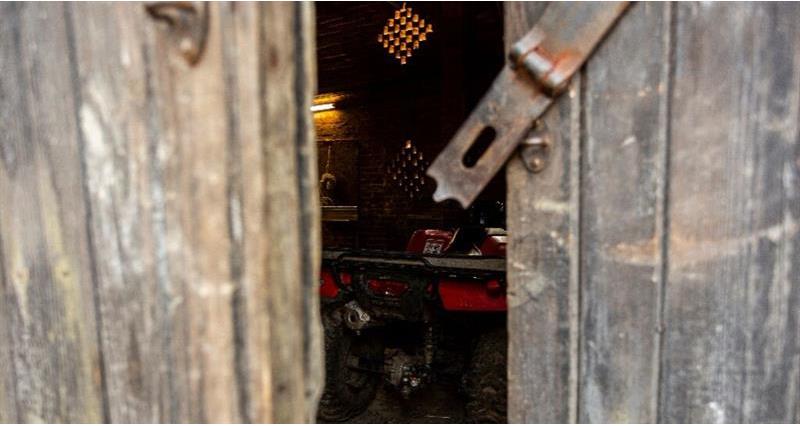Contact Crimestoppers to give information 100% anonymously about rural crime. Submit information online at www.crimestoppers-uk.org or call 0800 555 1111.
Use these links to jump to a particular section:
Machinery theft | Fuel theft | Metal theft | Livestock theft | Online fraud | Who to call and when | Member offers | Read more
Machinery theft
Steps you can take to prevent machinery theft happening on your land:
- Where possible, vehicles should be housed in a lockable garage or building, ideally with security lighting installed to the perimeter.
- Vehicles should always be locked when not in use, with the keys kept hidden and locked away in a secure location.
- Keep recordings or photographs of serial numbers and vehicles as these can be crucial in recovery, should the worst happen.
Steps you can take to prevent theft of quads and all-terrain vehicles:
- Invest in a bespoke quad security device, such as Quadvice or a quality padlock and chain, such as those approved by Secured By Design - a police approved product scheme. Securing to a fixed point on the ground or something that takes time to remove will also act as a deterrent.
- Never leave your keys in the ignition, even if you only briefly leave your ATV unattended.
- Keep gates to yards closed as open gates can be an open invitation to thieves.
Steps you can take to prevent theft of tractors:
- Mark machinery with DNA marking devices and SmartWater tools
- Sign up to CESAR, an agricultural equipment registration scheme, which increases the chance of recovering stolen goods by helping police identify stolen machinery
- Have the Vehicle Identification Number etched on windows. This makes the vehicle more detectable and less appealing to thieves because they have to grind out the numbers.
- Install immobilisers, chip keys and trackers as these are a simple way to deter criminals or track vehicles and can be fitted easily by an experienced agricultural engineer.
Fuel theft
Steps you can take to prevent fuel theft happening on your land:
- Store fuel tanks within secure buildings or cages, keeping them locked and alarmed.
- Install an anti-siphon device on vehicles.
- Protect fuel tanks by equipping them with an alarm that will sound when fuel levels drop.
- Install CCTV that focuses on fuel tanks.
- Keep a regular inventory so you can identify missing fuel.
Metal theft
Metal thefts and overhead cables - do you want to know more? Read our member exclusive article.
Livestock theft
Steps you can take to prevent livestock theft happening on your land:
- Padlock all gates.
- Ensure stock is clearly marked and records are up to date.
- Graze livestock away from roads.
- Check stock regularly and at varying times.
- Consider a high-tech system such as TecTracer, which puts thousands of coded microdot markers into the fleece. The codes are virtually impossible to removed. Use signs to show that livestock are marked with the product.
- Ask neighbours to report unusual vehicles loading sheep.
- Gate or fence alarms.
What to do if you are a victim of livestock theft:
- Contact the police immediately (999 if a crime is in progress, 101 if it has already happened).
- Contact your insurers who will provide further advice. At NFU Mutual, farmers are covered for theft and mysterious disappearance. It must be reported to the police and a crime reference must be given
- Use social media. The more details you can share on social media, such as sheep breed, age, marking, ear tag numbers, the better.
Online fraud
Here are some steps you can take to prevent online fraud:
- Secure and protect your property, including laptops, computers and smart phones by storing in a safe place.
- Enable password protection using a strong unique password.
- Enable two-factor authentication. This means as well as your password you must have access to a second proof of identity. Get step-by-step instructions on how to turn on two-factor authentication.
- Back up your important data. Keep the copy separate from your computer.
- Have up-to-date anti-virus software in place on all your computer systems and ensure that computer firewalls are switched on.
- Regularly update your operating system and installed software on your devices.
- Treat phone calls, texts and emails claiming to be from authentic sources with suspicion.
- If you’re presented with an unusual request, contact the organisation yourself to check the authenticity.
- Be wary of online fraud and scams. Be sceptical – if it sounds too good to be true, it probably is.
What to do if you’ve become a victim of online fraud
- Report suspicious emails to NCSC’s Suspicious Email Reporting Service, SERS, at report@phishing.gov.uk.
- Suspicious text messages should be forwarded to 7726 –you can do this free of charge.
- Report fraud to Action Fraud using the fraud reporting tool at www.actionfraud.police.uk, or by calling 0300 123 2040.
- Or report anonymously to Crimestoppers or call 0800 555 111.
More information
The NFU has partnered with the National Cyber Security Centre (NCSC) to produce an online booklet to support farmers in preventing and reporting cybercrime.
- Download the booklet here: Cyber security for farmers: Practical tips on how to stay safe
- Visit the NCSC for further information and resources on cybercrime
More from NFUonline:
Who to call and when?
Urgent: If a crime is in progress dial 999.
Non-urgent: Dial 101 to report a crime after it has taken place.
Provide information: Contact Crimestoppers to give information 100% anonymously. You can submit information online at www.crimestoppers-uk.org or call 0800 555 1111
- Find out how using the what3words app could help locate crime
- Read the NFUs Combatting Rural Crime report
- NFU working with police leaders to tackle fuel theft
